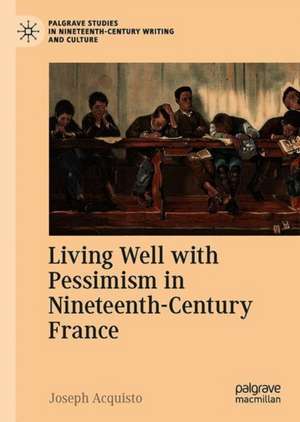Living Well with Pessimism in Nineteenth-Century France: Palgrave Studies in Nineteenth-Century Writing and Culture
Autor Joseph Acquistoen Limba Engleză Hardback – 5 feb 2021
| Toate formatele și edițiile | Preț | Express |
|---|---|---|
| Paperback (1) | 387.96 lei 43-57 zile | |
| Springer International Publishing – 5 feb 2022 | 387.96 lei 43-57 zile | |
| Hardback (1) | 392.75 lei 43-57 zile | |
| Springer International Publishing – 5 feb 2021 | 392.75 lei 43-57 zile |
Din seria Palgrave Studies in Nineteenth-Century Writing and Culture
- 15%
 Preț: 584.43 lei
Preț: 584.43 lei - 9%
 Preț: 695.71 lei
Preț: 695.71 lei - 20%
 Preț: 691.57 lei
Preț: 691.57 lei - 15%
 Preț: 646.30 lei
Preț: 646.30 lei - 15%
 Preț: 526.18 lei
Preț: 526.18 lei -
 Preț: 389.11 lei
Preț: 389.11 lei -
 Preț: 384.70 lei
Preț: 384.70 lei -
 Preț: 390.63 lei
Preț: 390.63 lei -
 Preț: 390.63 lei
Preț: 390.63 lei -
 Preț: 390.63 lei
Preț: 390.63 lei -
 Preț: 388.72 lei
Preț: 388.72 lei -
 Preț: 388.72 lei
Preț: 388.72 lei -
 Preț: 390.63 lei
Preț: 390.63 lei -
 Preț: 389.31 lei
Preț: 389.31 lei -
 Preț: 388.72 lei
Preț: 388.72 lei - 15%
 Preț: 700.75 lei
Preț: 700.75 lei - 18%
 Preț: 731.10 lei
Preț: 731.10 lei -
 Preț: 387.75 lei
Preț: 387.75 lei - 15%
 Preț: 651.51 lei
Preț: 651.51 lei -
 Preț: 390.63 lei
Preț: 390.63 lei -
 Preț: 386.81 lei
Preț: 386.81 lei -
 Preț: 390.63 lei
Preț: 390.63 lei -
 Preț: 388.72 lei
Preț: 388.72 lei -
 Preț: 389.11 lei
Preț: 389.11 lei -
 Preț: 389.88 lei
Preț: 389.88 lei - 15%
 Preț: 641.71 lei
Preț: 641.71 lei -
 Preț: 386.61 lei
Preț: 386.61 lei - 15%
 Preț: 584.43 lei
Preț: 584.43 lei -
 Preț: 392.60 lei
Preț: 392.60 lei -
 Preț: 390.84 lei
Preț: 390.84 lei -
 Preț: 387.75 lei
Preț: 387.75 lei -
 Preț: 392.97 lei
Preț: 392.97 lei - 15%
 Preț: 642.36 lei
Preț: 642.36 lei - 15%
 Preț: 582.80 lei
Preț: 582.80 lei - 15%
 Preț: 639.25 lei
Preț: 639.25 lei -
 Preț: 388.72 lei
Preț: 388.72 lei -
 Preț: 387.20 lei
Preț: 387.20 lei - 15%
 Preț: 642.51 lei
Preț: 642.51 lei -
 Preț: 384.31 lei
Preț: 384.31 lei -
 Preț: 387.75 lei
Preț: 387.75 lei -
 Preț: 389.70 lei
Preț: 389.70 lei
Preț: 392.75 lei
Nou
Puncte Express: 589
Preț estimativ în valută:
75.15€ • 78.68$ • 62.18£
75.15€ • 78.68$ • 62.18£
Carte tipărită la comandă
Livrare economică 07-21 aprilie
Preluare comenzi: 021 569.72.76
Specificații
ISBN-13: 9783030610135
ISBN-10: 3030610136
Pagini: 304
Ilustrații: VII, 304 p.
Dimensiuni: 148 x 210 x 24 mm
Greutate: 0.53 kg
Ediția:1st ed. 2021
Editura: Springer International Publishing
Colecția Palgrave Macmillan
Seria Palgrave Studies in Nineteenth-Century Writing and Culture
Locul publicării:Cham, Switzerland
ISBN-10: 3030610136
Pagini: 304
Ilustrații: VII, 304 p.
Dimensiuni: 148 x 210 x 24 mm
Greutate: 0.53 kg
Ediția:1st ed. 2021
Editura: Springer International Publishing
Colecția Palgrave Macmillan
Seria Palgrave Studies in Nineteenth-Century Writing and Culture
Locul publicării:Cham, Switzerland
Cuprins
1. Introduction.- 2. Schopenhauer: Resignation, Compassion, and Narrative.- 3. Debates on Pessimism in Late Nineteenth-Century France.- 4. Pessimism and the Novel: Fiction and the “As-If”.- 5. Pessimism and the Poetic Imagination.- 6. Conclusion: Living Well with Pessimism, Then and Now
Recenzii
“This book is an ambitious endeavor, drawing from an extensive range of sources and thinkers. It is well-written and coherent ... . Scholars of literature, philosophy, culture studies, and intellectual history will find this volume inspiring and insightful; moreover, it will appeal to specialists of nineteenth[1]century French literature as well as readers of the history of ideas in general.” (Karen Humphreys, Nineteenth-Century French Studies, ncfs-journal.org, Vol. 52 (3-4), 2024)
Notă biografică
Joseph Acquisto is a Professor of French at the University of Vermont, USA. His books include Poetry’s Knowing Ignorance (2020), Proust, Music, and Meaning (2017), The Fall Out of Redemption: Writing and Thinking Beyond Salvation in Baudelaire, Cioran, Fondane, Agamben, and Nancy (2015), and French Symbolist Poetry and the Idea of Music (2006).
Textul de pe ultima copertă
This book traces the emergence of modern pessimism in nineteenth-century France and examines its aesthetic, epistemological, ethical, and political implications. It explores how, since pessimism as a worldview is not empirically verifiable, writers on pessimism shift the discussion to verisimilitude, opening up rich territory for cross-fertilization between philosophy and literature. The book traces debates on pessimism in the nineteenth century among French nonfiction writers who either lauded its promotion of compassion or condemned it for being a sick and unliveable attempt at renunciation. It then examines the way novelists and poets take up and transform these questions by portraying characters in lived situations that serve as testing grounds for the merits or limitations of pessimism. The debate on pessimism that emerged in the nineteenth century is still very much with us, and this book offers an interhistorical argumentfor embracing pessimism as a way of living well in the world, aesthetically, ethically, and politically.
Caracteristici
Examines the rise of modern pessimism and debates surrounding it in nineteenth-century France Argues that pessimism provides an understanding of the modern world and an approach to it that can help us live well in it Explores a wide range of fiction and non-fiction writers whose approach to pessimism deepens the relationship between philosophy and literature
